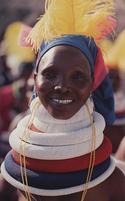A Group Concern

Marriage among the Ntwana is not an individual affair but a group concern, legalizing the relationship between relatives. It also confers adult status on the bride and groom. Although there are no kinship taboos among the Ntwana, cross-cousin marriages are still favoured.
The wedding (lenyalo) takes place over two days, first at the home of the bride's parents and thereafter at the groom's family homestead. Despite the fact that many Ntwana are Christians, marriages are conducted according to Ntwana custom.
The groom dresses in a city suit adorned with a bib made from animal hide. By contrast, the bride dons full traditional bridal regalia, which includes a feather atop her head or a beaded headband, usually in red, blue or white. In addition to a frontal and rear apron, she also wears a blanket which she must keep around her shoulders on entering her mother-in-law's household.
This suggests that the Ntwana bride is made to feel conscious of her foreigner status until her mother-in-law performs a ritual which signifies that the newest addition to the family is indeed welcome.
But, while in theory the Ntwana bride shares her husband's status, in actuality she is only regarded as an adult on the birth of her first child, once her fertility has been proven. It is only then that she may wear the traditional paraphernalia of Ntwana women — decorated frontal and rear aprons — on a daily basis.